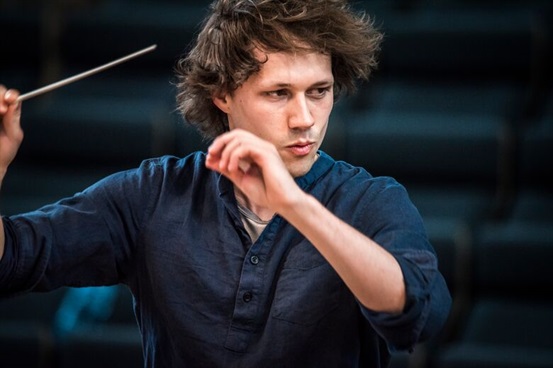
Oscar Jockel © Tom Schweers
ORF Radio-Symphonieorchester Wien / Wiener Singakademie / Jockel
Rossini: Stabat mater
Sunday
15
June
2025
19:30 – ca. 21:30
Großer Saal
Performers
ORF Radio-Symphonieorchester Wien
Wiener Singakademie
Einstudierung: Heinz Ferlesch
Federica Lombardi, Sopran
Teresa Iervolino, Mezzosopran
Santiago Ballerini, Tenor
Adolfo Corrado, Bass
Oscar Jockel, Dirigent
Programme
Oscar Jockel
asche ist weiß.
Maurice Ravel
Le tombeau de Couperin (Fassung für Orchester) (1914–1917/1919)
***
Gioachino Rossini
Stabat mater (1832–1841)
Note
Die Sopranistin Masabane Cecilia Rangwanasha und der Tenor Edgardo Rocha mussten ihre Mitwirkung aus persönlichen Gründen absagen. Wir danken Federica Lombardi und Santiago Ballerini für ihre Bereitschaft einzuspringen.
Gemeinsam veranstaltet mit RSO Wien
Medienpartner Ö1 Club
Subscription series
VokalKlang
Konzert.Kunst
Festival
41. Internationales Musikfest
Links
https://www.wienersingakademie.at
https://rso.orf.at
https://www.oscarjockel.com
Presented by
Wiener Konzerthausgesellschaft
Rossinis »Stabat mater«
The young conductor Oscar Jockel, who was awarded the Herbert von Karajan Prize in 2023, and a group of mostly equally young soloists, together with the Vienna Singakademie and the ORF Vienna Radio Symphony Orchestra, dedicate themselves to a vocal work that is extraordinary in many respects: his »Stabat mater« is one of the few sacred compositions with which Gioachino Rossini, whose numerous operas are an integral part of the repertoire of music theaters, is occasionally also present in the concert hall. Stylistically, the work - with choruses, ensembles, arias and even a recitative - hardly differs from a gripping bel canto opera. However, this setting of the sequence for the Feast of the Seven Sorrows of Mary would not be suitable for liturgical use anyway. Although the premiere of the first version, to which Rossini's pupil Giovanni Tadolini had also contributed, actually took place on Good Friday in 1833 in an Augustinian convent in Madrid, the premiere of the final version, which was entirely Rossini's work, was no longer performed in a church setting but at the Théâtre-Italien in Paris in 1842. The decisive reason why the piece survives today only as a concert work is its length alone: at almost an hour long, it is one of the most extensive settings of this text. Rossini's »Stabat mater« was only surpassed in this respect in 1877 by Antonín Dvořák's »Stabat mater«, which lasted just under one and a half hours - while Rossini's compatriot Giuseppe Verdi was to make do with just twelve minutes a further two decades later.
Media Partner
